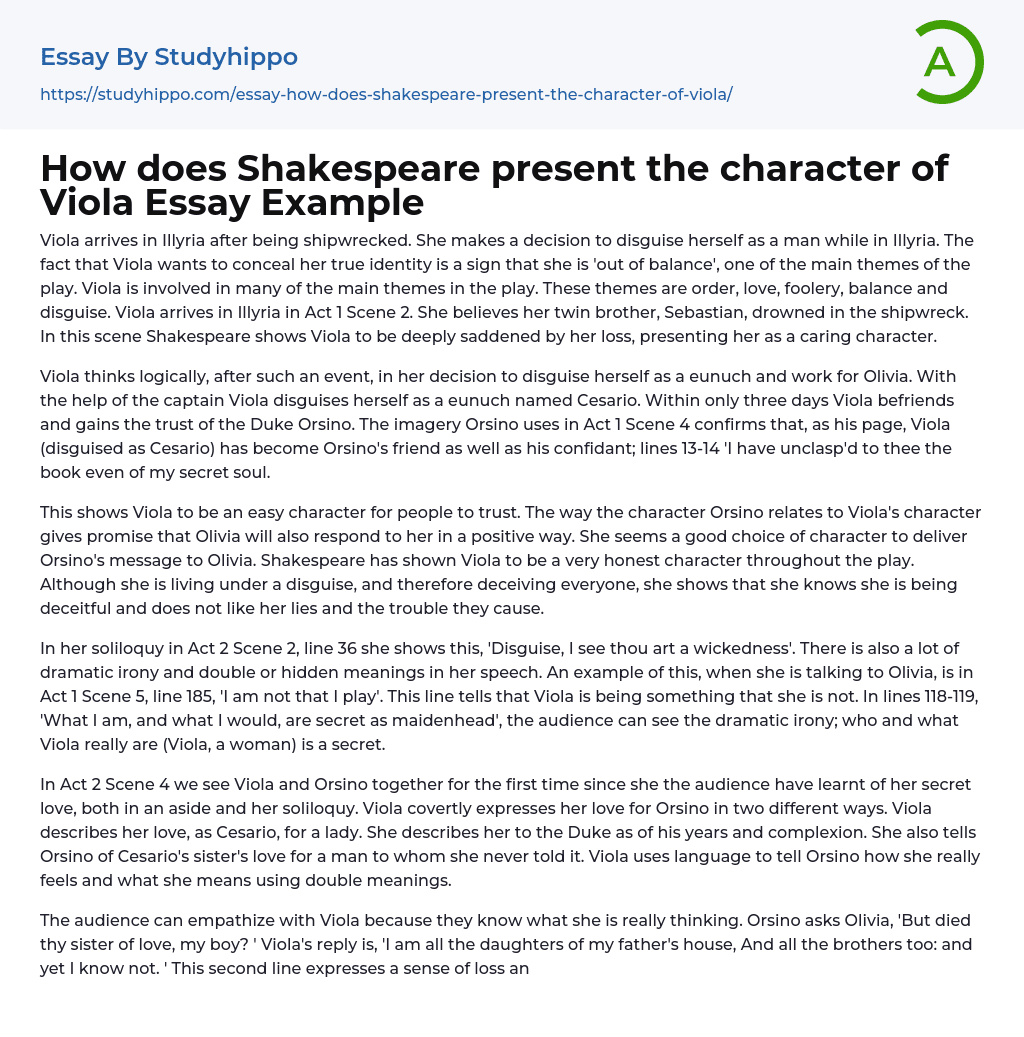

How does Shakespeare present the character of Viola Essay Example
Viola arrives in Illyria after being shipwrecked. She makes a decision to disguise herself as a man while in Illyria. The fact that Viola wants to conceal her true identity is a sign that she is 'out of balance', one of the main themes of the play. Viola is involved in many of the main themes in the play. These themes are order, love, foolery, balance and disguise. Viola arrives in Illyria in Act 1 Scene 2. She believes her twin brother, Sebastian, drowned in the shipwreck. In this scene Shakespeare shows Viola to be deeply saddened by her loss, presenting her as a caring character.
Viola thinks logically, after such an event, in her decision to disguise herself as a eunuch and work for Olivia. With the help of the captain Viola disguises herself as a eunuch named Cesa
...rio. Within only three days Viola befriends and gains the trust of the Duke Orsino. The imagery Orsino uses in Act 1 Scene 4 confirms that, as his page, Viola (disguised as Cesario) has become Orsino's friend as well as his confidant; lines 13-14 'I have unclasp'd to thee the book even of my secret soul.
This shows Viola to be an easy character for people to trust. The way the character Orsino relates to Viola's character gives promise that Olivia will also respond to her in a positive way. She seems a good choice of character to deliver Orsino's message to Olivia. Shakespeare has shown Viola to be a very honest character throughout the play. Although she is living under a disguise, and therefore deceiving everyone, she shows that she knows she is being deceitful and does
not like her lies and the trouble they cause.
In her soliloquy in Act 2 Scene 2, line 36 she shows this, 'Disguise, I see thou art a wickedness'. There is also a lot of dramatic irony and double or hidden meanings in her speech. An example of this, when she is talking to Olivia, is in Act 1 Scene 5, line 185, 'I am not that I play'. This line tells that Viola is being something that she is not. In lines 118-119, 'What I am, and what I would, are secret as maidenhead', the audience can see the dramatic irony; who and what Viola really are (Viola, a woman) is a secret.
In Act 2 Scene 4 we see Viola and Orsino together for the first time since she the audience have learnt of her secret love, both in an aside and her soliloquy. Viola covertly expresses her love for Orsino in two different ways. Viola describes her love, as Cesario, for a lady. She describes her to the Duke as of his years and complexion. She also tells Orsino of Cesario's sister's love for a man to whom she never told it. Viola uses language to tell Orsino how she really feels and what she means using double meanings.
The audience can empathize with Viola because they know what she is really thinking. Orsino asks Olivia, 'But died thy sister of love, my boy? ' Viola's reply is, 'I am all the daughters of my father's house, And all the brothers too: and yet I know not. ' This second line expresses a sense of loss and loneliness, but also shows hope and resilience. Viola
realizes that Olivia has fallen in love with her when Malvolio gives her the ring from Olivia. In her soliloquy she concludes that her 'outside' has 'charm'd' Olivia.
Her response is to pity and feel sorry for Olivia because her own character can show understanding which she cannot as Cesario. Throughout the play Viola matches the fool in witty banter. Shakespeare shows the two characters to be linguistically equal. This adds to the understanding of Viola. She proves to be a match for all of the characters. This occurs a lot in Act 3 Scene 1. The clown wishes Cesario a beard. In this conversation the clown uses language to hint that he knows more than the other characters in the play. Viola responds by matching the clown.
- First person essays
- American Literature essays
- Between The World and Me essays
- Book Report essays
- Book Review essays
- Book Summary essays
- Books essays
- Character essays
- Coming of Age essays
- Dante's Inferno essays
- Everyday Use essays
- Flowers for Algernon essays
- Genre essays
- Greek Mythology essays
- Incidents in The Life of a Slave Girl essays
- Letter essays
- Literary Criticism essays
- Literary devices essays
- Literature Review essays
- Metaphor essays
- Myth essays
- Play essays
- Plot essays
- Poem essays
- Poetry Analysis essays
- Protagonist essays
- Reader essays
- Reason essays
- Rhetoric essays
- Rhetorical Question essays
- Rhyme essays
- Simile essays
- Tragic Hero essays
- Translation essays
- Understanding essays
- Utopia essays
- Villain essays
- Writer essays
- A Doll's House essays
- A Midsummer Night's Dream essays
- A raisin in the sun essays
- A Streetcar Named Desire essays
- An Inspector Calls essays
- Death of a salesman essays
- Everyman essays
- Fences essays
- Hamlet essays
- Hedda Gabler essays
- Iago essays
- King Lear essays



